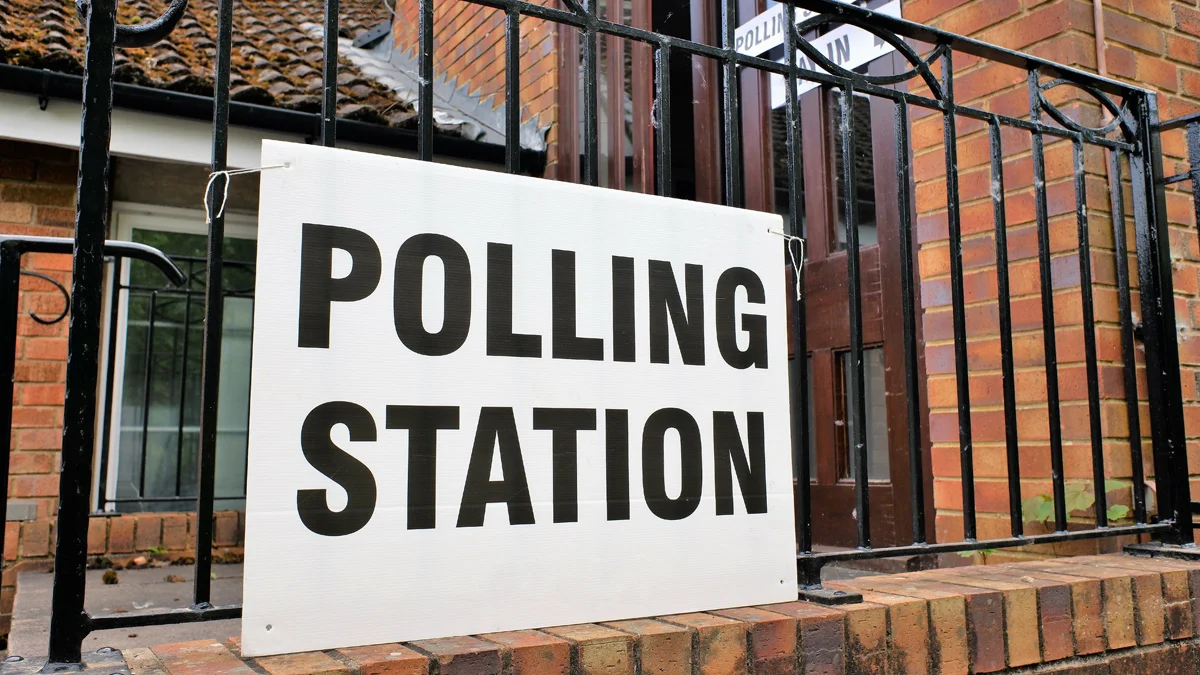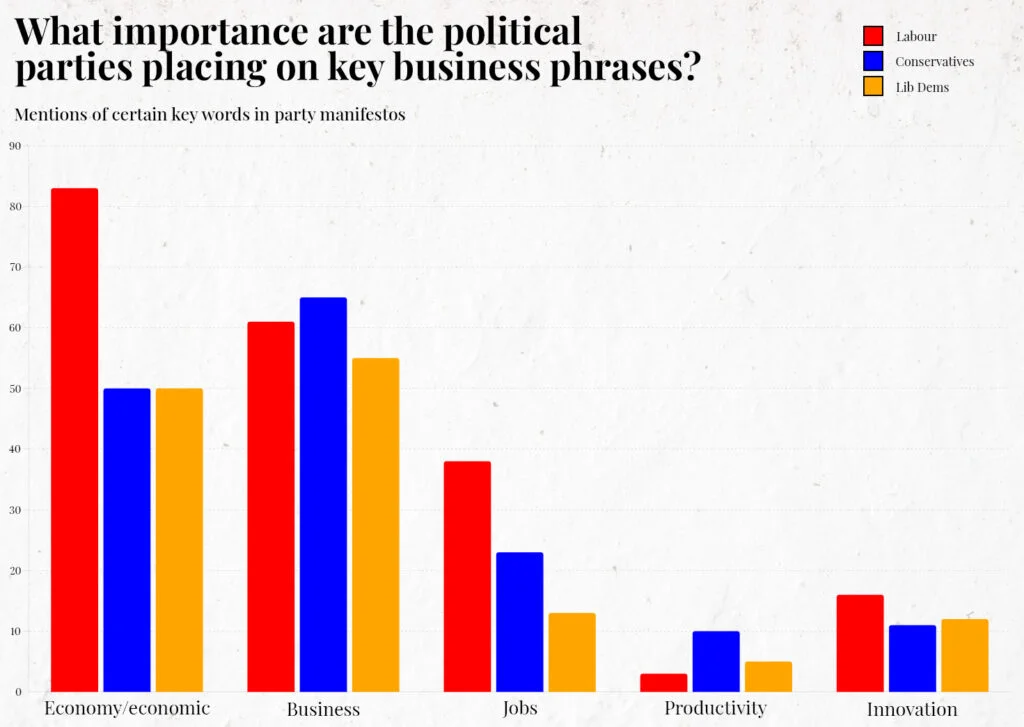
This article is an online version of our Off to Lunch newsletter. Sign up to receive it straight to your inbox here.
Happy Friday and first day of the Euros for those who celebrate. Today, we’re looking at the main party manifestos and the policies that affect medium-sized businesses and the people who run them.
Labour: “Pro-business and pro-worker"
The Labour manifesto says it is “pro-business and pro-worker” and “the party of wealth creation”. It vows to keep some of the policies the current government has instilled, such as the 25 per cent corporation tax cap, permanent full expensing system for capital investment and the annual investment allowance for small business.
The party has promised a reform of business rates but hasn’t detailed what that will involve. It says it will replace the business rates system “so we can raise the same revenue but in a fairer way”.
Another area of reform involves the British Business Bank. The key mandate will be to make it easier for medium-sized businesses to access capital. The party also promises to reform procurement rules to give these businesses greater access to government contracts.
One of the party’s other big pledges is the creation of a National Wealth Fund. Its focus would be to make “transformative investments across every part of the country”. The party says that its target is to “attract £3 of private investment for every £1 of public investment”.
The director of the Institute for Fiscal Studies, Paul Johnson, hammered Starmer yesterday saying the plans would “require putting actual resources on the table” but that the manifesto “offers no indication that there is a plan for where the money would come from to finance this”.
Conservatives: “The party of business”
In the same address, Johnson also said the Labour manifesto was better than “a shopping list of half-baked policy announcements” – an apparent reference to the Conservatives’ offering. Having been overtaken by Reform UK, according to a new YouGov poll, the government is firmly on the ropes less than three weeks away from election day.
The Tory manifesto claims that it “will always be the party of business” and it is full of reaffirmations of the party’s record. It promises not to raise corporation tax or capital gains tax and to “continue to ease the burden of business rates”, without getting into specifics. This lack of specifics continues in its mention of the VAT threshold, which the party says it will keep “under review and explore options to smooth the cliff edge at £90,000”.
Another promise is to improve access to finance for SMEs “including through expanding Open Finance and by exploring the creation of Regional Mutual Banks” and to secure a £250m fund to support female entrepreneurs. A 10 per cent increase in R&D spending, maintaining R&D tax reliefs and creating more Freeports are also mentioned in the manifesto.
The Conservatives also pledged to “seize the benefits of Brexit”. One of the ways they will look to do this to lift the employee threshold allowing more companies to be considered medium-sized. The party claims this will save small businesses “at least 1 million hours of admin per year”.

Lib Dems: “Powering scale-up companies”
Ed Davey, the leader of the Lib Dems, seems to have a campaign strategy that involves living out a teenager's dream in front of the country’s news cameras; the party celebrated its manifesto launch at Thorpe Park. However, Davey has used these photo ops to get his party’s message out with relative success.
His party's manifesto is laced with swipes at the Tories but has a distinct lack of detail, instead opting for pledges like “powering scale-up companies, especially outside London and the South East, using innovative ways of ‘crowding-in’ private sector investment.”
But it has made a bold play to “abolish business rates and replace them with a Commercial Landowner Levy”. The party also says it would “make the case for increasing the global minimum rate of corporation tax to 21 per cent”.
Greens: “Greener and fairer future”
The Greens are offering a “greener and fairer” future across areas including healthcare, the economy and democracy. It wants a “just transition” to a zero-carbon economy through a £4bn a year investment in skills and training; £40bn investment (including £7bn on climate adaption) in economic transformation in areas including an electrified railway, water and sewage infrastructure and retrofitting buildings; £30bn investment in R&D focused on tackling climate and environmental crises; a carbon tax and privatised utilities.
For small and medium-sized businesses it will back the setting up of regional mutual banks capitalised through a Co-operative Development Fund funded by £10bn of public money. It will also bring the Prompt Payment Code into law.
Alongside this, the Greens will “change the way success is measured in the economy” with new indicators that consider the wellbeing of people and planet. And it will look to make work fairer through initiatives such as a 10:1 pay ratio, minimum wage of £15 an hour and an expansion of pay-gap protections to all protected characteristics including ethnicity, disability and sexual orientation.
Reform: “Contract with the people”
Reform doesn’t release its full manifesto (or as it calls it, its “contract with the people”) until 17 June. But it has announced some economic measures already, including increasing the income tax threshold from £12,570 to £20,000, reducing corporation tax to 20 per cent, abolishing IR35 rules, scrapping business rates for small and medium-sized businesses, bringing in a 3 per cent online delivery tax and raising the VAT threshold to £120,000.
It also wants to abandon existing carbon emission targets, scrap green subsidies, freeze “non-essential” migration and get 2 million people back into work, with a particular focus on those aged 16 to 34.
Business Question
England and Scotland faced off in the first ever international football match, but in which year?
A. 1864
B. 1872
C. 1889
D. 1904
The answer can be found at the bottom of the page.
Business in Brief
Everything you need to know
1. Tesco's sales across the group increased 4.5 per cent in the 13 weeks to 25 May to £15.6bn, an improvement it puts down to investments in low prices. Its performance was even stronger at home - its UK market seeing sales rise 5.3% to £11.4bn. The strong performance means CEO Ken Murphy's pay package will hit nearly £10m this year. You can read more here.
2. Virgin Hotels is to open its first branch in London this summer. This will be the eighth Virgin hotel, with other properties in New York and Edinburgh. Owner Sir Richard Branson says the hotel chain continues his strategy of disrupting the travel industry in areas where he can "make a difference". Read more here.
3. Wells Fargo has fired more than a dozen employees in the US after it claims they were faking keyboard activity to make it look like they were working when they weren't. It is not clear what techniques the staff used to allegedly fake work or whether they were working remotely. Find out more here.
4. With the Euros kicking off in Germany today, Adidas has released its ad for the competition. After decades of disappointment (and a couple of near misses in recent tournaments), Adidas has put Jude Bellingham centre stage and backed it with The Beatles hit Hey Jude. If you're an England fan, it'll have you dreaming of a win. You can watch it " target="_blank" rel="noreferrer noopener">here.
5. Tesla's shareholders have voted for chief executive Elon Musk's $45bn pay package, as well as to move the electric vehicle maker to Texas. The move strengthens the company's hand as it attempts to overturn a decision by a court in Delaware to void the 2018 stock options package due to concerns at the value and questions over the board's independence. You can read more here.
Business Quotes
Inspiration from leaders
"Be a yardstick of quality. Some people aren’t used to an environment where excellence is expected."
- Steve Jobs
Business Thinker
Ideas on the future of business and leadership
1. ??The $100m quest to build the world’s greatest golf ball??
2. ?Why co-founder partnerships fail — and how to make them last ?
3. ??Undemocratic, anachronistic, fantastic. How the City survives ??
4. ?The Boston Celtics’ championship gamble? A trade they didn’t make ?
And finally...
Depending on your point of view, Excel is either the bane or boon of your working life. Some love nothing more than a spreadsheet, others won't be found within 10 feet of one.
But whatever you think, there's no doubt it's a hugely important tool for many businesses, helping everyone from analysts to accountants to do their jobs better.
With that in mind, The Verge has taken a deep dive into the Excel World Championships. The annual event in Las Vegas sets competitors tasks they must complete using Excel. One in the article, called Potions Master, goes as follows:
You’re training to be a potions master in Excelburg, but you’re terrible at it. You have a number of ingredients, each of which has a certain number of associated points; your goal is to get the most points in each potion before it explodes, which it does based on how much of a white ingredient you’ve added.
Competitors are given 30 minutes to get as many points as possible. But, as the reporter David Pierce, this is in and of itself a superpower.
"The folks in this room make their living on their ability to take some complex thing — a company’s sales, a person’s lifestyle, a region’s political leanings, a race car — and pull it apart into its many component pieces. If you can reduce the world down to a bunch of rows and columns, you can control it. Manipulate it. Build it and rebuild it in a thousand new ways, with a couple of hotkeys and an undo button at the ready.
"A good spreadsheet shows you the universe and gives you the ability to create new ones. And the people in this room, in their dad jeans and short-sleeved button-downs, are the gods on Olympus, bending everything to their will."
The full article is well worth a read. You can find it here. And if you think your Excel skills are up to scratch, you can sign up to qualify for an event later in the year here.
The answer to today's Business Question is B. 1872.
Related and recommended
With Labour committed to spending more on defence, we need to be clearer on the trade-offs – while realising ultimately it can boost the economy
Labour believes a trade deal with the US will change its political fortunes, but there are numerous obstacles in the way
The Olympic cycling champion has brought lessons from his time in sport to his work in business
How do you build a company culture that nurtures game-changing ideas? Start with mindset, feedback and failure

